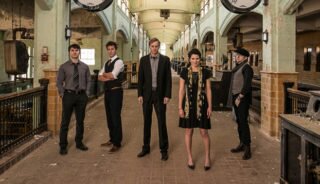
Christopher Nolan wouldn’t be the first director to pop into a cinephile’s mind when asked who would be the perfect auteur to bring the tale of the Battle of Dunkirk to the big screen. The battle, which saw British soldiers attempt to retreat across the English Channel from the coastal city of Dunkirk in the early years of World War II, doesn’t have the same aura of “one man’s battle to win at any cost against the odds” that Nolan’s earlier work in Interstellar or the Batman franchise had in abundance.
What Nolan does bring to Dunkirk, and does so in spades, is the sense of immediate action that is on display in those earlier works. Within seconds of the film beginning, we are thrust into the wartime life of teenage soldier Tommy (newcomer Fionn Whitehead), and his struggles to stay alive. Shot at by unseen enemies while trying to relieve himself, he runs while his friends die around him, only to find himself moments later on the beaches of Dunkirk. Just one more soldier doing what he must to survive, we watch as Tommy finds himself fighting to survive everything from torpedo attacks to fellow soldiers’ threats at gunpoint.
Tonight in downtown Raleigh, Marbles IMAX invites you to experience history unfold in front of you via the largest IMAX screen in North Carolina, and afterwards listen as those who have studied the battle tell you what may have been left out of the movie. At 4:30pm today Matthew Booker, Associate Professor of History at NC State University, will hold a program entitled How We Remember the Past: Military and Social History of Dunkirk. He will be discussing how the Battle of Dunkirk has seemingly fallen through the cracks of most Americans’ knowledge of World War II conflicts, as well as how the civilians left at home during the conflict dealt with the aftermath of the soldiers returning home.
I had a chance to discuss these themes with Professor Booker before his program. Having caught him before he had actually had a chance to watch the film, some of the things we discuss about the actual conflicts are a soldier’s grappling with a retreat viewed as a victory; how Dunkirk was a turning point in England’s preparation for future battles during the War; and how Americans have been unfair to the French.
Isaac Weeks: Why does it feel like no one seems to know much about the Battle of Dunkirk? Even folks who have watched everything on World War II that the History Channel has to offer seem to stare blankly when asked about it.
Matthew Booker: I’ve been thinking about this recently as well, the stories we tell about Dunkirk, and I began wondering the same thing you did: why do we hesitate telling the story on some of the battles of World War II? The first thing to remember, for most Americans, is that World War II is filtered through a very narrow lens; we see the war through American activities in that conflict, so for most of us the War is about D Day and the rapid fall of the German government in 1944 and 1945. I think that is the simplest explanation, that we tend to think of war conflicts through our engagement in them, and the greatest of them – World War II – was the worst of them all.
That’s actually one of the things that I rather like about this film, that it seems to be an attempt at instructing people worldwide about the earlier stages of that war, when there was nothing inevitable at all about the outcome. Everything was really unclear.
IW: One of the things that really hit me at the end of the film was the emotional struggle that some of the characters – some of the soldiers – were having after surviving the battle through retreat. Was that something that a lot of soldiers grappled with in battles that the Allieds didn’t win?
MB: It is true that retreat is a basic part of warfare; in fact, I think the true takeaway from the Dunkirk event – from a military historian’s perspective – would be that it was a strategic retreat. It allowed the British to fight again, because they lose a lot of heavy equipment, really the ability to wage offensive warfare, but they managed to retain the most critical piece of any army or military, which is it’s people. In that sense it was a triumph while still remaining a disaster, and it revealed just how disorganized the Allies – in particular the British – were in the first months of the War.
That grappling with emotions that previous generations just didn’t acknowledge in their public lives, but the experience of war is probably the worst experience that a human being can endure. Not just getting killed, or watching your friends getting killed, but also in the participation of killing. As the line goes, war is hell, and most Americans don’t really know that; we haven’t had a war within our own territory since the 1860s. We’ve had attacks in far flung places like Pearl Harbor, but we haven’t had to watch our cities burn since the 1860s, if you happened to live in Richmond, Virginia at that time.
The experience of retreat is sensed as a failure because society has built up – even amongst the English and French – an expectation for soldiers to win and be brave.
IW: The film makes a point to show how the English citizens who welcomed the soldiers home did so enthusiastically. Is there the sense that they did so because they were a bit more openminded about the end result of the Dunkirk battle, since so many within England had just witnessed war closely in World War I?
MB: The lived experience of the average person in Europe in 1940 was very different from our own time. When we wage war, most of the American conflicts are held in the air, as far back as World War II when so much of our offensive was in bombing things through the air. That method was brilliant, by the way, because it drastically reduced our number of American military deaths. In Europe, World War I basically scraped the top off of an entire generation of men, and left behind millions of wounded and their families. Survival was viewed as a win by most of Europe by the time World War II came about.
The other thing is that the British didn’t really know what World War II was going to be, and you see this particularly among the military brass, who were hoping that they could get into another trench warfare situation; that was what they had planned on. For them, the survival of individual soldiers was more important than something like tanks. After Dunkirk, they would quickly learn that World War II would be about machines. It was about oil and machines.
IW: You haven’t watched the film yet. Do you have certain things that you are hoping that the film does right, as a historian, that maybe other war films haven’t gotten correct in the past?
MB: Yeah, there are actually two things I’d love to see, one general and one specific.
The general one is that anybody that has talked to men who have been to war, in the rare moments that they will talk about what they went through, what you get from them is a sense of chaos and tragedy. They never knew what was going on until sometime afterwards, and there is always this feeling of uncertainty. Orders get lost and phone calls don’t go through; famously, before the Battle of Dunkirk, one of the French generals crashed into a truck in the middle of the night and was killed at a critical moment. Just the chaos that men experienced every day during war, sometimes dying before ever getting a shot off, or never seeing the enemy. That’s what I would love to see, because I think that’s what war is really like, when boiled down to the experience of the individual.
More specifically…you mentioned how Americans don’t know that much about Dunkirk, but it’s a key piece of the British story of World War II. It’s also important to the French and Belgians, but they see it in very different ways. If I could have an agenda for Dunkirk, it would be to rectify what I see as a great historical wrong, and that is the blame on the French for the way that they failed in World War II. There’s a whole history of Americans viewing the French as “surrender monkeys”, who failed and were cowardly, and I think that is a profound injustice. When I read all of these stories about Dunkirk, what I see over and over is that it is the French army who are the heroes, not the relatively few yachtsmen and merchant marines who sailed from Britain. It’s the French who died on the beaches to help the British get away. The British left behind 40,000 French troops who were trying to get on the boats, not to mention the Belgians and Dutch.
I would love to see this film honor the French for fighting desperately to save another group of people. I think that’s remarkable.
(Visited 354 times, 6 visits today)








